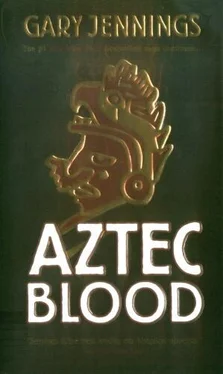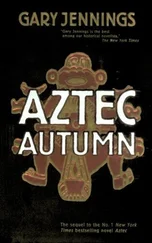Gary Jennings - Aztec Blood
Здесь есть возможность читать онлайн «Gary Jennings - Aztec Blood» весь текст электронной книги совершенно бесплатно (целиком полную версию без сокращений). В некоторых случаях можно слушать аудио, скачать через торрент в формате fb2 и присутствует краткое содержание. Жанр: Старинная литература, на английском языке. Описание произведения, (предисловие) а так же отзывы посетителей доступны на портале библиотеки ЛибКат.
- Название:Aztec Blood
- Автор:
- Жанр:
- Год:неизвестен
- ISBN:нет данных
- Рейтинг книги:4 / 5. Голосов: 1
-
Избранное:Добавить в избранное
- Отзывы:
-
Ваша оценка:
- 80
- 1
- 2
- 3
- 4
- 5
Aztec Blood: краткое содержание, описание и аннотация
Предлагаем к чтению аннотацию, описание, краткое содержание или предисловие (зависит от того, что написал сам автор книги «Aztec Blood»). Если вы не нашли необходимую информацию о книге — напишите в комментариях, мы постараемся отыскать её.
Aztec Blood — читать онлайн бесплатно полную книгу (весь текст) целиком
Ниже представлен текст книги, разбитый по страницам. Система сохранения места последней прочитанной страницы, позволяет с удобством читать онлайн бесплатно книгу «Aztec Blood», без необходимости каждый раз заново искать на чём Вы остановились. Поставьте закладку, и сможете в любой момент перейти на страницу, на которой закончили чтение.
Интервал:
Закладка:
PART TWO
You have no mother.
—Fray Antonio
FOUR
Call me Cristo.
I was born in the village of Aguetza in the vast Valley of Mexico. My Aztec ancestors built temples in the valley to please the sun, moon, and rain gods, but after the indio gods were vanquished by Cortes and his conquistadors, the land and the indios upon it were divided into large haciendas, feudal domains owned by Spanish grandees. Composed of a few hundred jacals—huts of sun-baked, mud-and-straw bricks—the village of Aguetza and all of its people belonged to the hacienda of Don Francisco Perez Montero de Ibarra.
The small stone church was near the riverbank on the village side. On the other side of the river were the shops, corrals, and the great house of the hacienda. The great house was built like a fortress with a high, thick wall, gun ports, and a huge door with iron braces. A coat of arms blazoned the wall beside the door.
In our time it is said that the sun never sets upon the Spanish Empire, for it dominates, not just Europe, but stretches around the world, encompassing most of the New World, then across to the Philippines and footholds in the land of the Hindu and Africa. New Spain, with its vast riches in silver and land, is one of the prizes of the empire.
The Spanish generally referred to all of the indios of New Spain as "Aztecs," even though there were many indio tribes—the Tarasco, Otomi, Totonac, Zapotec, Maya, and others, often with their own language.
I grew up speaking both Náhuatl, the Aztec tongue, and Spanish.
As I mentioned before, in my own veins was the blood of Spain and the Aztecs. Because of that mixture, I was called a mestizo, a name that meant I was neither español nor indio. Fray Antonio, the village priest who had much to do with my upbringing and education, said that a mestizo was born into a border place between heaven and hell where dwell those whose souls are deprived of the joy of heaven. While the fray was rarely wrong, in this case he had misjudged the damnation of mestizos. Rather than limbo, it was a state of living hell.
The fray's church was built on the spot where there had once been a small temple devoted to Huitzilopochtli, the mighty Aztec tribal war god. After the conquest the temple had been torn down and its stones used to build a Christian temple on the same spot. From then on the indios gave praise to the Christian Savior rather than the Aztec gods.
The hacienda was a small kingdom in and of itself. The indios who worked the land grew maize, beans, squash, and other food stuffs, horses, cattle, sheep, and swine. Workshops created almost everything that was used on the hacienda, from the shoes for horses and plows for tilling the soil, to the rough carts with wooden wheels used to haul the harvest. Only the fine furnishings, china and linens of the great house used by the hacendado, Don Francisco, came from outside the hacienda.
I shared the hut of my mother, Miaha. Her Christian name was Maria, for the blessed Mother of Christ. Her Aztec name, Miahauxiuitl, meant Turquoise Maize Flower in our Náhuatl tongue. Except in the presence of the village priest, she was called by her Náhuatl name.
She was the first mother I knew. I called her Miaha, which was what she preferred.
It was common knowledge that Don Francisco lay with Miaha, and everyone believed that I was his son. The bastardos dropped by indias after intercourse with Spaniards were not favored by either race. To the Spaniard I was just an increase in his stock of dray animals. When Don Francisco looked at me, he saw not a child but a piece of property. The don proffered no more affection toward me than he did to the cattle grazing in his fields.
Accepted by neither Spanish nor indios, even children spurned me as a playmate, I learned early that my hands and feet existed solely to defend my mixed blood.
Nor was there sanctuary for me in the hacienda's main house. The don's son, José, was a year older than myself; his twin daughters, Maribel and Isabella, two years older. None of them were permitted to play with me, although they were allowed to beat me at will.
Doña Amelia was unrelentingly venomous. For her I was sin incarnate—living proof that her husband, the don, had stuck his garrancha between the legs of an india.
This was the world I grew up in, Spanish and indio by blood, but accepted by neither—and cursed by a secret that would one day shake the foundations of a great house of New Spain.
"What is this secret, Cristóbal? Tell it to us!"
Ayyo, the dungeon master's words appear on my paper like black ghosts.
Patience, Señor Capitán, patience. Soon you will know the secret of my birth and of other treasures. I will reveal the secrets in words the blind can see and the deaf can hear, but at present my mind is too weak from hunger and deprivation to do so. It will have to wait until I have regained my strength from decent food and sweet water....
The day came when I saw with my own eyes how a person like me, who carried the blood taint, was treated when they rebelled. I was more than halfway through my eleventh year when I came out of the hut I shared with my mother carrying my fishing spear when I heard horses and shouting.
"¡Andale! ¡Andale! ¡Apurate!" Hurry! Hurry!
Two men on horseback were driving a man before them with whips. Running and staggering, the horses breathing down his neck, their powerful hoofs hammering at his heels, the man came toward me down the village path.
The horsemen were Don Francisco's soldados, Spaniards who protected the hacienda from bandits with their muskets and used their whips to keep the indios working the fields.
"Andale, mestizo!"
He was a half-breed like me. Dressed as a peasant, he was lighter of skin and taller than an indio, reflecting the infusion of español and indio blood. I was the only mestizo on the hacienda and the man was a stranger to me. I knew there were other mestizos in the valley. Occasionally one passed through the hacienda with the burro trains that bring supplies and haul away hides and the crops of maize and beans.
A horseman rode up beside the mestizo and quirted him savagely. The man staggered and fell, belly down. His shirt was torn and bloody, his back a mass of bleeding whip marks.
The other soldado charged with a lance and shoved the pole in the man's backside. The man struggled to his feet and staggered down the village lane toward us. He lost his footing again, and the horsemen wheeled, resuming their attack with whip and lance.
"Who is he?" I asked my mother as she came up beside me.
"A mine slave," she said. "A mestizo who has escaped from one of the northern silver mines. He came to some of the workers in the field asking for food, and they called the soldados. Mines pay a reward for runaways."
"Why are they beating him?"
It was a stupid question that required no answer from my mother. I might as well have asked why an oxen is whipped to pull a plow. Mestizos and indios were dray animals. Forbidden to leave the haciendas, they were the property of their Spanish masters. When they strayed, they were whipped like any other animal that disobeyed its master. The king's laws actually protected indios from being put to death, but there was no protection for half-bloods.
As the man got closer, I saw that his face was marred by more than blood.
"His face is branded," I said.
"Mine owners brand their slaves," Miaha said. "When they're traded or sold to other mines, more brands are burned on. This man was branded by many masters."
I had heard of this practice from the fray. He explained that when the Crown gave the conquistadors their original land grants, they also granted them tribute-paying indios. Many of these early settlers branded their indios. Some even burned their initials into the foreheads of the indios to ensure that they could not stray. The king finally forbade the branding of encomienda indios and it came to be used only for the forced laborers and criminals who work in the dreaded silver mines.
Читать дальшеИнтервал:
Закладка:
Похожие книги на «Aztec Blood»
Представляем Вашему вниманию похожие книги на «Aztec Blood» списком для выбора. Мы отобрали схожую по названию и смыслу литературу в надежде предоставить читателям больше вариантов отыскать новые, интересные, ещё непрочитанные произведения.
Обсуждение, отзывы о книге «Aztec Blood» и просто собственные мнения читателей. Оставьте ваши комментарии, напишите, что Вы думаете о произведении, его смысле или главных героях. Укажите что конкретно понравилось, а что нет, и почему Вы так считаете.











